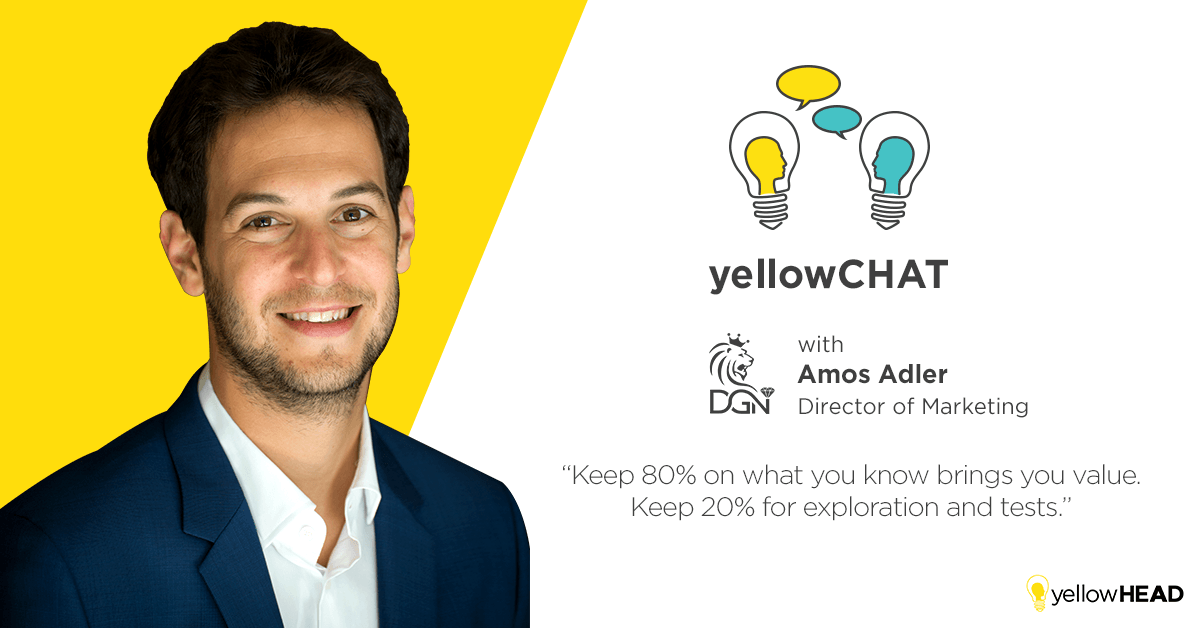Move Over, Kids – It’s Amos’ Turn to Play. DGN’s Amos Adler on Social Casino App Marketing
Amos from DGN has proven that passion and work can go hand in hand. He has always been a gamer and plans to continue being on, even when his kids are grown. He would play games on Sega before he could even read English – it was captivating.
While studying for his industrial engineering degree at Tel Aviv University, he came across a friend playing a game on Facebook for work. The idea fascinated him. He quickly left his Project Manager position at HP and sought a position at a digital media agency for social casino & gaming companies, which eventually lead to his current position at DGN.
Amos now leads his team at DGN in all media buying operations for UA & retention and manages the ASO operations lead by yellowHEAD.
With so many social casino apps on the market, what kind of app marketing strategies do you implement to differentiate yourself from your competitors? What have you seen work best?
It’s an extremely crowded eco-system because of the simplistic gaming mechanism, so it’s harder to define yourself and offer a unique value proposition.
Old Vegas Slots is the pioneer in this genre. It invented the classic slots genre, so, pretty much, everyone copied or iterated on it.
Lucky Times Slots entered the industry later to the video slots vertical. This side has more competition and more advanced competitors. We really needed to find our niche in this eco-system.
We firmly believe that our premium content is remarkable and loyal to REAL customer games. We have several teams worldwide, designing machines that appeal to different slots players. Especially Australian slot machines with the look, feel and features.
Then there’s the fact that our slots have real casino-style math with fixed RTP, which we can’t say about some of the competitors out there. We’re pretty set on the mid-hardcore casino enthusiasts.
Conversion optimization is a big part of app marketing. Typically, what kind of approach do you take to building and testing your creatives?
We try to be loyal to our unique value proposition and what we bring to the table.
We promote stuff about our game content in geos that we think are the most loyal or have the most correlation to our games, which is why we’re strong in Australia and New Zealand. We try to be loyal to that in our creatives – sometimes it can be to our advantage, sometimes not.
There’s a tradeoff between being thorough and methodical, and saving money. We operate on very short-term KPIs. We analyze and see the correlation from the short-term and long-term KPIs, and eventually profitability. As a growing company, we don’t have the luxury to spend and spend just on testing. We need to bring results, because it’s our growth engine.
Due to my background as an engineer, I personally like data analytics and statistics. We try to do it as methodically as possible in order to have different concepts to test, while minimizing other decision variables whether it’s targeting, bidding or budget. It’s important to really follow up on an analysis – on what may have responded better, or what might have been the cause for it.
Everyone at my previous job in the social department had an engineering background, so they all came from a very analytical standpoint. They developed their expertise in social casinos through the knowledge management that was there.
Being detail-oriented and very data-driven puts the Israeli market on another level than competitors. We’re focused on value and being dynamic.
Building an in-house team or working with vendors can be a tough decision. How do you decide which one to go with?
I was brought to DGN in order to move at least most of the marketing in-house. There’s a lot of advantages to keeping a diverse portfolio of marketers – benchmarks, creatives, knowledge sharing, not putting all your eggs in one basket. I do think that you should be dynamic. But it’s cheaper to do it in-house – there’s less links in a chain, you have access to more data and creative assets, and it can be more efficient. It depends on the amount of knowledge you have in-house and the current results. We have a very strong team at DGN that was built from scratch, especially for social.
Agencies have a narrower perspective for one game, but, simultaneously, a wider perspective because they can see competitors’ performance. For example, they know what creatives might work better in the industry. In ASO, they know what trends might convert better. It brings value when you can propose these ideas to a client. The interests are aligned – our success from your campaigns is your success and vice versa.
It’s a very strict environment. Each one of us has people we need to report to, and we need to be responsible with where we are spending our money. We’re dealing with millions of dollars, so we need to make sure that we are focusing our money on providers that bring us value.
On a personal note, when you’re not focusing on growing your user base, what is your passion?
I have a newborn kid, so for the past 5 months my passions have been squashed. I like to listen to a lot of podcasts: Joe Rogan, scientific podcast, politics. I love music, so I listen to a lot of relaxing music at work. Gaming is something that will hopefully always stick with me. I definitely see myself telling my kids, “Move over. It’s my turn to play.” I also enjoy TV, movies, and MMA (Mixed Martial Arts).
What advice would you give someone who is just entering the social casino field?
Keep 80% on what you know brings you value; keep 20% for exploration and tests. We will always think we may have hit an optimal point, but it might be a local optimal point. If I’m spending most of my campaign on what works really well, eventually it will die down. We must give ourselves the opportunity to reach new heights and ground-breaking points.
Once you find your audience, creativity is key. Always keep what resonates with your audience.
What is your golden tip?
The 80:20 rule is my golden tip, but I’ll add to it. Always be very dynamic in adverting budgets. Check it day to day, and even if you have specific budgets between platforms and countries, and different targeting segments, always optimize the budgets. You don’t have to build segments – you can minimize other segments. But it’s something that I truly believe must be done daily in order to squeeze results and make it optimal.
Being data-driven is key. Don’t fall in love with campaigns. Don’t make decisions based on ten installs or a low amount of conversions. Never think that you know everything. Everything is moving forward super-fast. A feature that worked well in the past, might not be relevant six months later.


